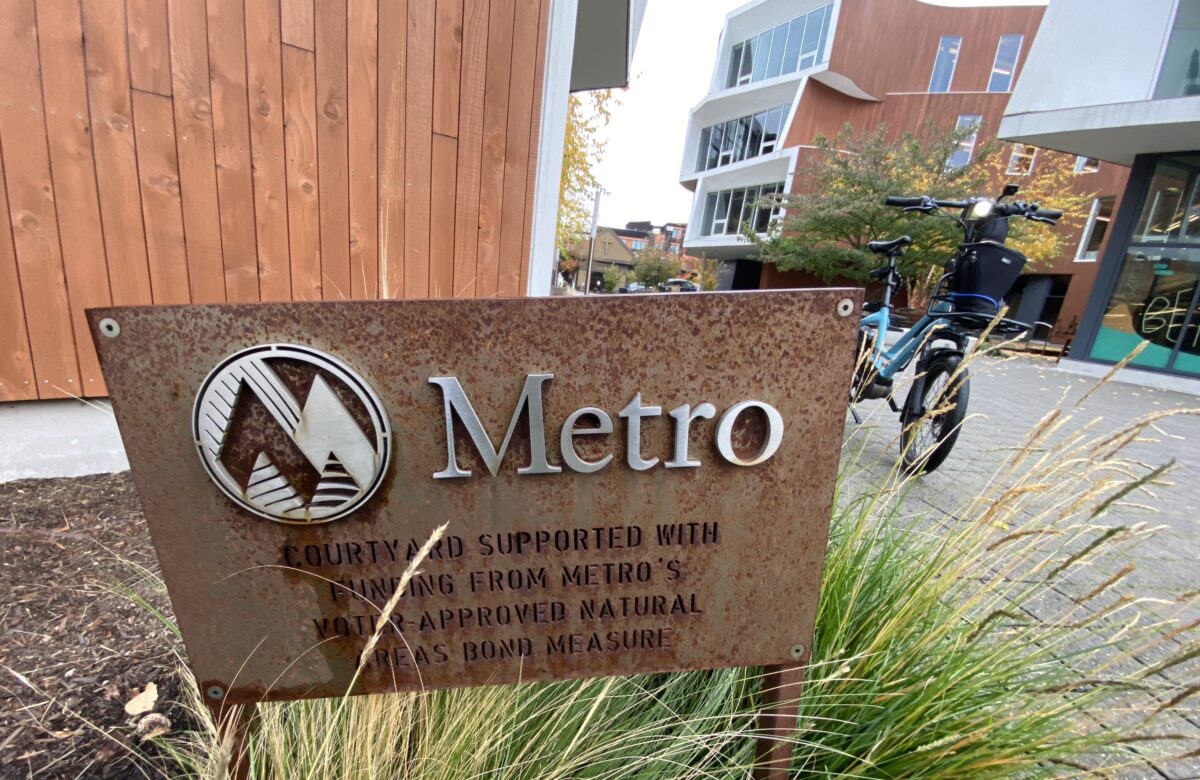
(Photo: Jonathan Maus/BikePortland)
“We are working to ensure that the courtyard is enjoyed as it was always intended.”
— Carrie Belding, Metro
Portlander Nora Lehmann was shocked during a recent walk to see cars parked in what was usually a serene courtyard near the corner of North Vancouver and Fremont.
“I’m so upset,” she posted to Twitter. “The beautifully landscaped plaza at the One North building on Williams has apparently been turned into a parking lot?! WTAF is there nowhere in this town where cars don’t ruin everything?!”
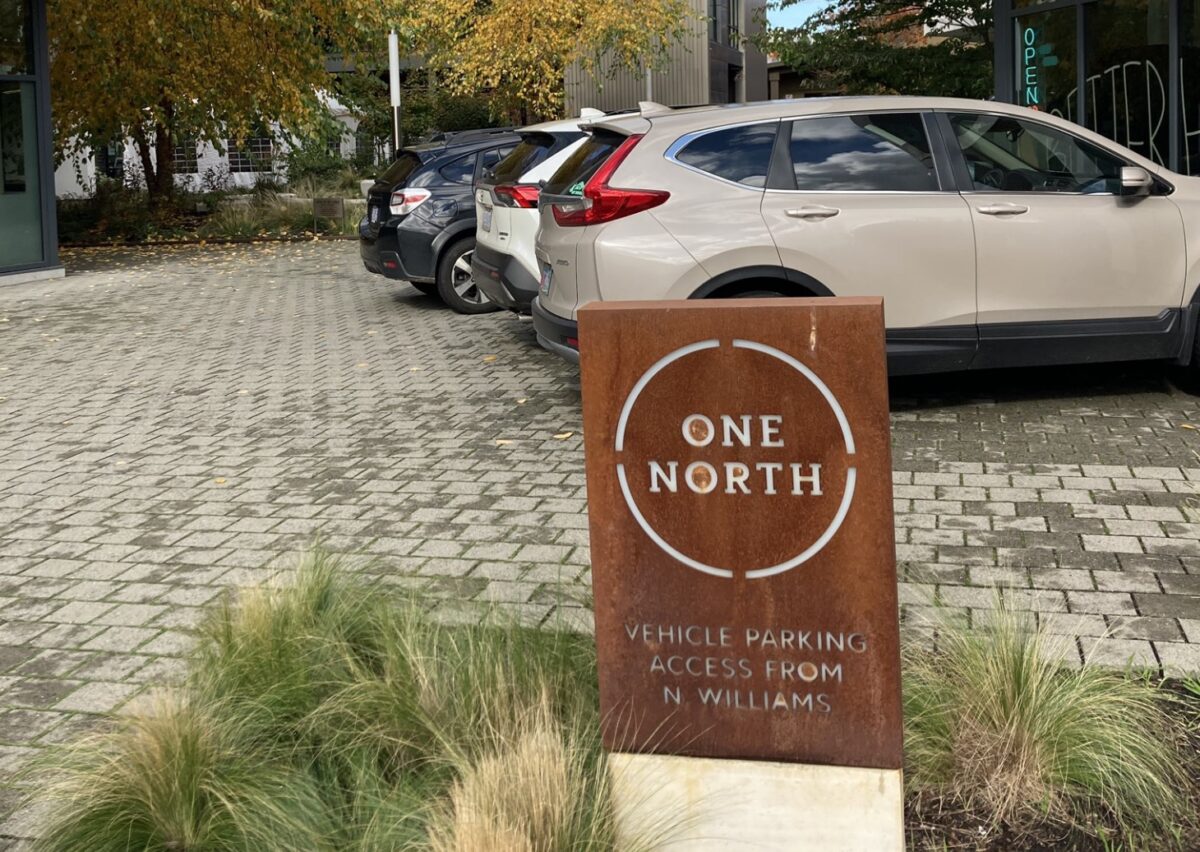
(Photos: Nora Lehmann)
Eagle-eyed sleuths Iain Mackenzie (@maccoinnich) and others who follow Nora quickly pointed out that that particular lot was funded with a Metro “Nature in Neighborhood” grant under specific requirements that it be set aside as a community gathering space — not as a place to park cars. According to a description of the $420,313 grant award on Metro’s website, the courtyard is supposed to give people an, “opportunity to experience urban ecology close to home.” “At the One North Community Courtyard, a new public plaza centrally located in a dense, urban area will offer a neighborhood gathering place surrounded by natural plantings,” it says.
Advertisement
I’ve visited the site a few times since seeing Nora’s post and haven’t seen cars parked there.
Officials from Metro and the Portland Bureau of Transportation (PBOT owns the public easement for the courtyard) have also visited the site, according to Carrie Belding with Metro Parks and Nature Communications.
In an email to BikePortland, Belding said, “We are discussing the issue both internally and with PBOT and are working to ensure that the courtyard is enjoyed as it was always intended. We hope to be able to provide further updates this week.” Asked if business owners had been told parking is not allowed, Belding said that they are still coordinating those contacts.
UPDATE, 11/4: Metro worked with PBOT to contact the business and building owners to make sure folks to park in the plaza any more. The image below from Metro shows new signs that are now placed in the plaza:




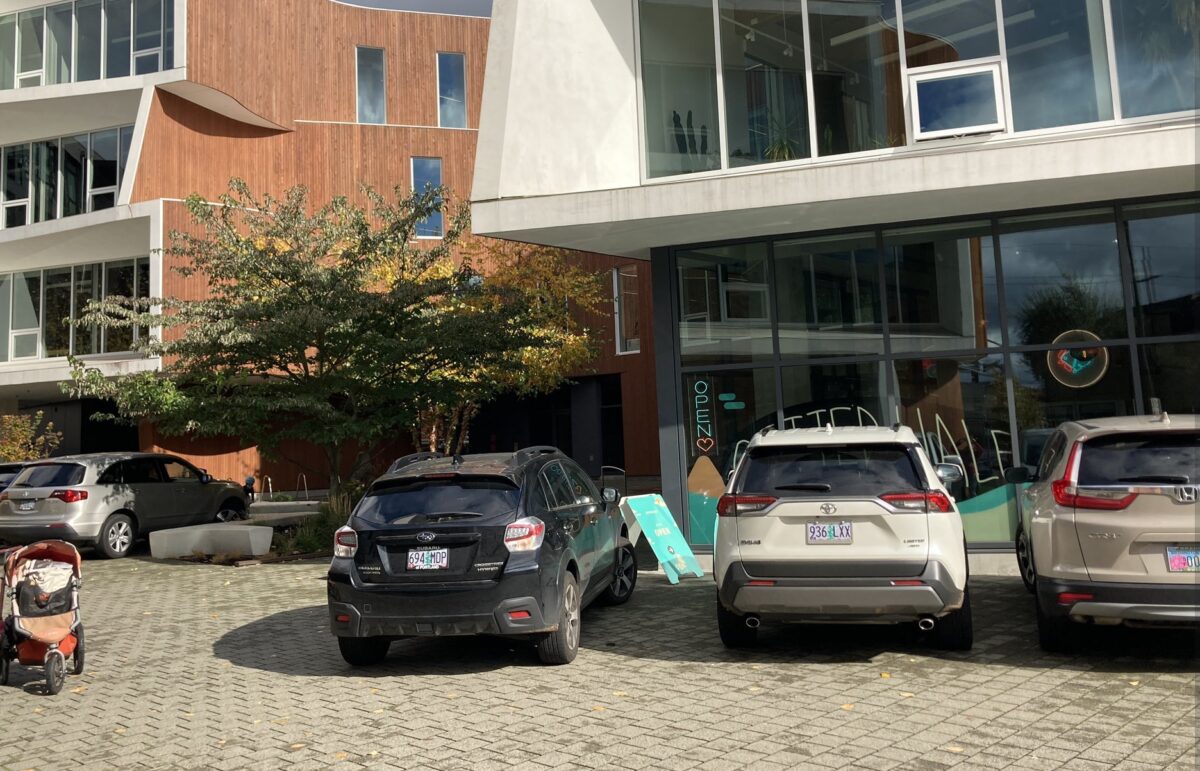


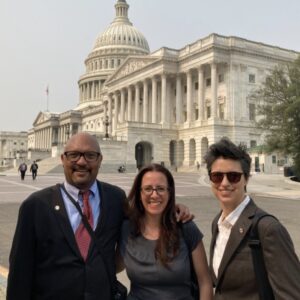

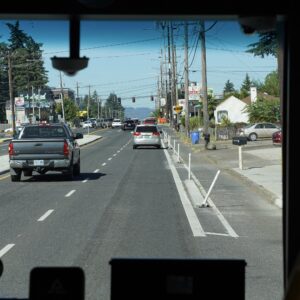
Thanks for reading.
BikePortland has served this community with independent community journalism since 2005. We rely on subscriptions from readers like you to survive. Your financial support is vital in keeping this valuable resource alive and well.
Please subscribe today to strengthen and expand our work.
It’s how drivers operate. If one does it they all do it. Same with someone ignoring you in a crosswalk- the first one pretends you’re not there and then then next 3 speed through, pretending not to see you too. I actually used to eat lunch in that plaza. Would be a shame to see it taken over.
It’s monkey see, monkey do with drivers. One of our neighbors used to almost always park on the wrong side of the street, and while they were here, a bunch of others started doing it too. Now that they’ve been gone for a year, people are mostly back to parking correctly.
So you’re in favor of charging for use of sidewalk bike racks?
Sure as long as it’s proportional to weight of vehicle, since that is what causes wear and tear on the road. Your 4000lb car would be $5 to park for 2 hours and my 25lb bike would be $.03. This would also incentivize drivers into lower weight, more efficient cars. Seems quite fair to me!
I’d kill to be able to pay $50 a month to have a network of secure bike parking boxes throughout the city I can access.
The metropolis of Salem has them in multiple spots in its downtown. I know it’s a lot but maybe lil ‘ol Portland can get there as it turns into a big city.
Someone who believes that these bike lockers will be used as intended (rather than drilled open to facilitate theft, ripped away for “recycling,” damaged for no reason at all like the Hawthorne Bridge bicycle counter, converted into non-bicycle storage, or repurposed as a wall for an encampment) should build a company around this idea.
Portland can’t even keep people from ripping open locked trash receptacles to dig for cans — and I wouldn’t expect better treatment for metal lockers storing bikes valuable enough to merit paid parking.
That sounds like a logistical nightmare to me, and would cost more to administer than it would generate in revenue. And I doubt you really want to align yourself with the people who would support what you are proposing.
How about this instead: we continue to allow bikes to park for free, and stop using ridiculously broad phrases like “private property” when we really mean just cars.
The ridiculous broadness seems useful. It emphasizes that while there are millions of things people own, cars are singled out over (at least almost) everything else as something people have gotten accustomed to society providing free public storage space for. Saying “private property” instead of “cars” points that out.
Those who care about accuracy more than theatrics should not use that phrase.
It is inaccurate to say that I can store personal property on the street. I can park my car, but not my shed, my planter box, or any other non-vehicle property (at least not without a special permit).
And, according to the law, I’m not even allowed to “store” a vehicle for more than 24 hours, though I realize enforcement is even more lax than it is for speeding and shooting.
There are several companies that provide shipping containers that people can place their belongings in (pods, u haul, etc). Common practice is to place these containers in the public right of way, sometimes for weeks at a time, even though this isn’t technically legal without a permit. Many people permanently store recreational vehicles, boats, or other objects in the street. This is not an issue that is limited to cars, and ppb does not enforce the 24 hour rule, in practice (though they should). There are numerous encroachments where people have built sheds or other structures in the right of way around Portland.
But that’s the whole point of using it. You’re right, about the only thing you can store legally on the street without special permission is a vehicle. Using that phrase reminds people how cars are treated so differently from other private property.
And you’re also right that saying “I can store personal property on the street” is not accurate–EXCEPT if the property is a car. Calling cars parked on the street “private property storage” is totally accurate. And that deserves some questioning, especially when it prevents other uses of that public space that could be more beneficial to the public. Saying “private property” instead of “cars” elicits that important questioning.
You can’t even legally “store” a vehicle on the street — that word has connotations of long-term placement, not the short-term usage that’s permitted under the law.
So really, there’s nothing accurate about that statement at all.
The phrase “no free storage of private property on public land” should be “no free short term leaving of privately owned vehicles on public right-of-way expressly designed and designated for that purpose.”
And really… if there were no cars parked on the street in your neighborhood, would the streets become any safer/better/more functional? Likely wider, more open streets would become more dangerous, with people driving faster and trying to pass one another, and with longer pedestrian crossing distances, so the whole concept seems counter-productive.
I value safety and sanity, and therefore I support some specific and caveated cases of free storage of private property on public land.
Tens of thousands of people in Portland park their cars on the street every single night of the year, and much of every day, for years, and it’s legal. “Storage” describes that much more accurately than “short-term usage”.
And nobody’s said anything about parking on the street always being bad, or removing parking without replacing the space with something other than vehicle area, as you describe. But often, people oppose things like adding bike lanes, widening narrow sidewalks, adding stormwater planters, and building new housing, because those will reduce on-street parking. All those things would definitely improve my neighborhood.
You might not be saying that, but some people with a propensity to use the same weird language are.
If you want to convince someone to support a bike lane past their business, please just say “parking”, unless you want to shut down the conversation fast.
not much other “private property” requires a public registration number and tax updates.
Yard materials come to mind.
boats, trailers, campers…
If it doesn’t say you can’t, you can.
Good work. Now we just need to get the big trucks off of all the East Portland sidewalks (not to mention all the other random stuff).
Seems like an odd design. Why do they have a curb cut here without bollards? Is the intent to just have service vehicles have access? Just looking at the Streetview, I can see why people are parking here. It looks like an unmarked parking lot.
The courtyard is partially private property and partially an alley (city right-of-way). The property owner at 3537-3539 N Williams didn’t want to give up the right to use the alley for access to parking at the rear of their property.
I bike by that space often and have seen cars park there off and on for months. Always wondered since it isn’t clearly signed.
Its simple Metro. Put up a no parking, or you will be towed sign. Then tow them away and fine them . Financial punishment is the only thing driving barbarians understand.
Ehh, that won’t work. When I lived next to Kenton Park there were regularly people that would drive into the park for bbq’s. Can’t be asked to walk to the picnic tables when a car can walk the stuff for you! I live near Lents Park and I see the same sorta thing here. I was running through Bloomington Park one late summer day and the same thing happened there. People are parking and driving on the 205 path. How many cars are parked over/on the sidewalk near you now? All over the city? Nothing matters. Cars rule.
Don’t they say…”use it or lose it”?
My 2 cents from afar: Seems that the residents / site manager have not been programming the space (formally or informally) frequently enough for local drivers to feel shy about parking long term there.
I assume this outdoor plaza space was designed based on Dutch residential woonerf / commercial winkle street spaces which allows some limited motor vehicle access. What does the project’s developer’s agreement say as to how this space is to be vehicular-ly managed (vs the METRO grant)?
PS. And after reading the WW article on this topic, the ‘hourly’ management of this plaza space is most likely NOT a government responsibility but the property management company’s.
The only time the CoP (or any local government) would be involved would be protecting access through the public “alley” portion (access to adjoining property, utilities, street, etc.) AND if they found that the property owner was not fulfilling their responsibility for how this off street public plaza space was to be managed per the planning review process with the CoP (KARUNA II PROJECT: case file LU 13-240623 DZM AD) as found in: developer’s agreement, covenant revisions, grant award, etc. There may be more details in the design revision from 2014 or earlier… I could not find much in the files on this project other than https://www.portlandoregon.gov/bds/article/500932
Portland, city of lots of rules but no enforcement. Ridiculous.
I hate seeing beautiful roads turned into bike lanes, as if causing more congestion is magically going to make things safe.
Here’s an idea, let’s fund police and anticrime measures before bike lanes. I’m tired of having to kick heroin users and violent criminals out of my business, because nobody shows up when I call 911.
Full disclosure: I own and enjoy bicycles. I don’t hate cyclists. I loathe poor funding priorities.
Thanks for venting your frustrations about bike lanes in the comment section of an article that has nothing to do with bike lanes.
I think it’s quite possible to fund road projects and police. The two are not mutually exclusive. And the politicians that are in favor of reducing police funding are not necessarily aligned with those that are in favor of expanding Portland’s bike network.
Are there any politicians at the city who are in favor of expanding Portland’s bike network? Based on past comments, maybe Mapps, but I’m not even sure about him.
I think all five commissioners are in favor of expanding the bike network. Why wouldn’t they be? The problem in Portland has never been a lack of support for cycling, it’s been the lack of someone calling the question.
So that’s what happened on Hawthorne?
Yeah. PBOT didn’t want the heat of pushing for a bike lane, so first they tried to cook the analysis in a way that made it seem like the bike lane wouldn’t be feasible. When they got called out on that, they agreed to do more analysis. When that analysis showed a bike lane would work, they came up with a new excuse: That a bike lane would cause delays for buses, which would therefore make bike lanes bad for Black and other people of color, and lower-income transit commuters from east Portland, as well as exacerbate climate change by turning those commuters into car users. Once that narrative was set, the bike lane was dead. At least this is my opinion of how it happened.
My understanding is that even that narrative* turned out to be based on faulty analysis (easily addressed by adding an unprotected bike lane in the approach to 39th). So a victory of narrative over fact?
*Now hold on… they were said the bike lanes would so badly snarl traffic and hold up buses, so people would make up the time by driving in that same snarled traffic?
“they came up with a new excuse: That a bike lane would cause delays for buses, which would therefore make bike lanes bad for Black and other people of color, and lower-income transit commuters from east Portland”
Nice retcon, Jonathan. PBOT’s original rationale was also that safety infrastructure funding should be prioritized for marginalized communities that lack even basic safety infrastructure (due to generations of intentional neglect).
We went over this. There was no appreciable extra expense to doing the bike lane treatment vs the adopted configuration. The money was for the road resurfacing and re-striping. The striping configuration was of no consequence when compared to the money spent on the roadbase.
It may be an oversimplification of PBOT’s motives to say they decided no bikes and then found successive justifications for it, it seems a bit more complex than that. But they were not saving money by not striping the bike lanes. The equity argument is that buses and cars carrying lower income commuters would be impacted by a bike lane.
If any elected officials are in favor, I’m sure it’s not a top priority.
I agree. While I think all of them would gladly vote for a good bike proposal (if it were presented/framed properly and without bias, unlike how PBOT said the Hawthorne Bike Lanes would be bad for the climate change and equity, for instance), it is certainly not a priority for anyone currently on council. The lack of priority for bicycling among elected leaders in Portland region is a larger problem that has festered for many years.
Please tell us more about your business!
JM – how do posts like this somehow pass muster? It’s off-topic, low-effort, and obvious trolling.
Yeah I don’t love the comment either, but I don’t think it rises to the level of being deleted. Thanks for the feedback. I’m open to reconsidering.
I think the comment is appropriate. Unless you want the comments to be a pro-bike echo chamber, different views should be encouraged. And the suggestion that it is inappropriate because off topic seems strained. Take this appropriate/inappropriate comment thread, for example.
Like it or not, desire lines apply to everything. Signs aren’t going to do it.
The ironic thing about the outrage in this blog post and in the comments is that the people parking are, according to the Willamette Week, delivery drivers for restaurants (e.g. Uber Eats and Grubhub) and for online shopping corps. I’m willing to bet that the blog host and just about every commentator uses these “services”. In fact, I suspect that “low-car” cycling advocates tend to use these kinds of services far more often than poor folk who park and use their cars out necessity.
https://www.wweek.com/news/2021/11/03/a-north-portland-courtyard-funded-with-greenspace-bond-dollars-is-being-used-as-uber-eats-parking/
The cognitive dissonance of people who use delivery services* complaining about cycling not being highlighted at COP26 is so thick even my sharpest knife cannot cut it.
*Oregon’s consumption GHG emissions dwarf personal transportation emissions and are increasing rapidly

“I suspect that “low-car” cycling advocates tend to use these kinds of services far more often than poor folk who park and use their cars out (sic) necessity.”
Citation needed. Otherwise this is just more random anger and attacking the strawmen you carefully curate on here on a daily basis.
Speaking for myself, I only get food delivered when the delivery person is directly employed by the restaurant, which means I pretty much never do it anymore. In fact I can’t even remember the last time I did that. Hot Lips, maybe, pre-pandemic?
Low-car cycling advocates tend to be upper income people who have the privilege of living in twee transportation and resource-rich inner city neighborhoods. As a founding member of BikeLoudPDX this was certainly my experience. This demographic is notorious for its stratospheric levels of consumption-associated GHG emissions (google Professor Daniel Aldana Cohen’s publications and visualizations).
PS: The entire point of my devil’s advocacy on bike portland is to challenge the hypernormalization of Oregon’s (and Portland’s) failure to even slow GHG emissions.
soren,
your incorrect assumptions and tendency to generalize people based on popular narratives really hurt your credibility imo.
also, i never use those food delivery companies.
1. I haven’t owned a car in 35 years
2. At the time I went car free I made $4.17/hour as a grocery clerk and lived in Beaverton while going to school downtown.
3. I have *never* used a food delivery service – I’m more than capable of riding over to Mio Sushi and picking it up myself.
4. Having products delivered to my place of business in the daily UPS delivery or to my Amazon locker removes extra trips for deliveries.
Huh – sounds like you’ve got me pegged alright.
It’s not so much the delivery but that online shopping is strongly associated with more frequent purchases of fewer items at a time. Post-Fordism is even worse for our shared environment than Fordism.
https://www.scientificamerican.com/article/delivery-from-local-store-is-greenest-shopping-method-most-of-the-time1/
I do the same thing shopping online as I do in-store. I make a list then make a “trip”, arrange to have the stuff delivered at the same time as much as possible to a location that is already being serviced by a vehicle.
Of course, I loathe shopping and we endeavor to make a single trip to each store weekly. I go to Freddy’s & New Seasons, she does Trader Joe’s and the farmer’s market.
I’m well aware of how consumer driven transportation is and that the largest part of my personal carbon footprint is likely my demand for goods that aren’t made/grown locally.
Ah well, it’s a good thing that that lifestyle has had personal benefits over the last 3 decades, it has obviously been a lost cause in terms of doing my part for the environment.
Fortunately I don’t have children and the world just needs to stay mostly liveable for about 30 more years (based on the life spans of my grandparents & great aunts/uncles who didn’t drink themselves to death).
The transportation component is one part of hyperconsumption-associated emissions but the larger part is the easy availability and socioeconomic promotion of artificially cheap products manufactured in areas with weaker environmental laws, less ability to decarbonize, weak labor laws, and other tragic negative externalities.
If the negative externalities of gasoline were fairly priced, not only would gasoline be far more expensive but alternative transportation modes would be far more available and competitive. Similarly, if the negative externalities of a $500 75 inch TV or a new iPhone were fairly priced, these would be far more infrequent purchases even for the upper classes and would be designed for durability and repair (as opposed to our current disposable hyperconsumption status quo).
Upper income person in inner-city here! You should have seen me this morning trying to figure out a way to take a bus home from dropping the car off at the garage. LOL. I ended up taking an Uber home.
For the trip back out the stars align and, if nothing goes wrong, I can make these two rush hour only lines mesh. Inner-city really doesn’t equal transit-rich, west of the W at least.
I have a friend who works food delivery, he says it’s the most money he’s ever made. I figured he was taking advantage of living in Portland Heights to get the downtown restaurant business, but no, he says Sandy Blvd is where he makes the most money, that’s his territory.
I agree that parts of SW PDX are like the resource poor areas I often get on my soapbox about. I’d happily defund “Better Naito” and dedicate some of that revenue to sidewalks in your neighborhood.
There is a stratospheric level of smug in your posts.
I know this article is posted on BikePortland, but there’s nothing in the text of this article (or indeed the Willamette Week article) about either cycling or living car free / low car. The question is about whether a publicly accessible space, that was partially funded using public money, should be a parking lot. If Uber Eats drivers are finding it hard to find pick up locations, the logical answer isn’t “let’s turn the plaza into a parking lot”; it’s to manage the existing parking in the area better. With parking on both sides of most stretches of both Williams and Vancouver, it would surely be possible to designate some spaces as dedicated to delivery pick-up activities, for example.
I walk my talk. I have never used UberEats or GrubHub (really? who eats grubs?), nor any other food delivery service, and generally eschew takeout altogether as it generates lots of wasteful packaging.
So that makes two of us, at least.
Wow, I’m out of touch with “New Portland” that’s blown up in the past few years. I used to bike by here daily, for years, but have never been to that plaza. Anyways, looks like the bollards on the north end are doing the job, but not for the cars that can park behind the house:
https://goo.gl/maps/zNyi6zh3YzDBsXCA6
And the signs about no parking are too subtle and designed such that no driver will notice. I’d probably pull in here with my car and park because I certainly don’t know any better, and don’t see any signage. Some kind of paint treatment of the cobbles/adding some planters to define the “through alley” would be better.
https://goo.gl/maps/DPSYmeG3Exttu8kWA
A similar attempt was made at the Halsey-Weidler “plaza” at 103rd. They added concrete blocks, but they have all since been shoved aside for parking…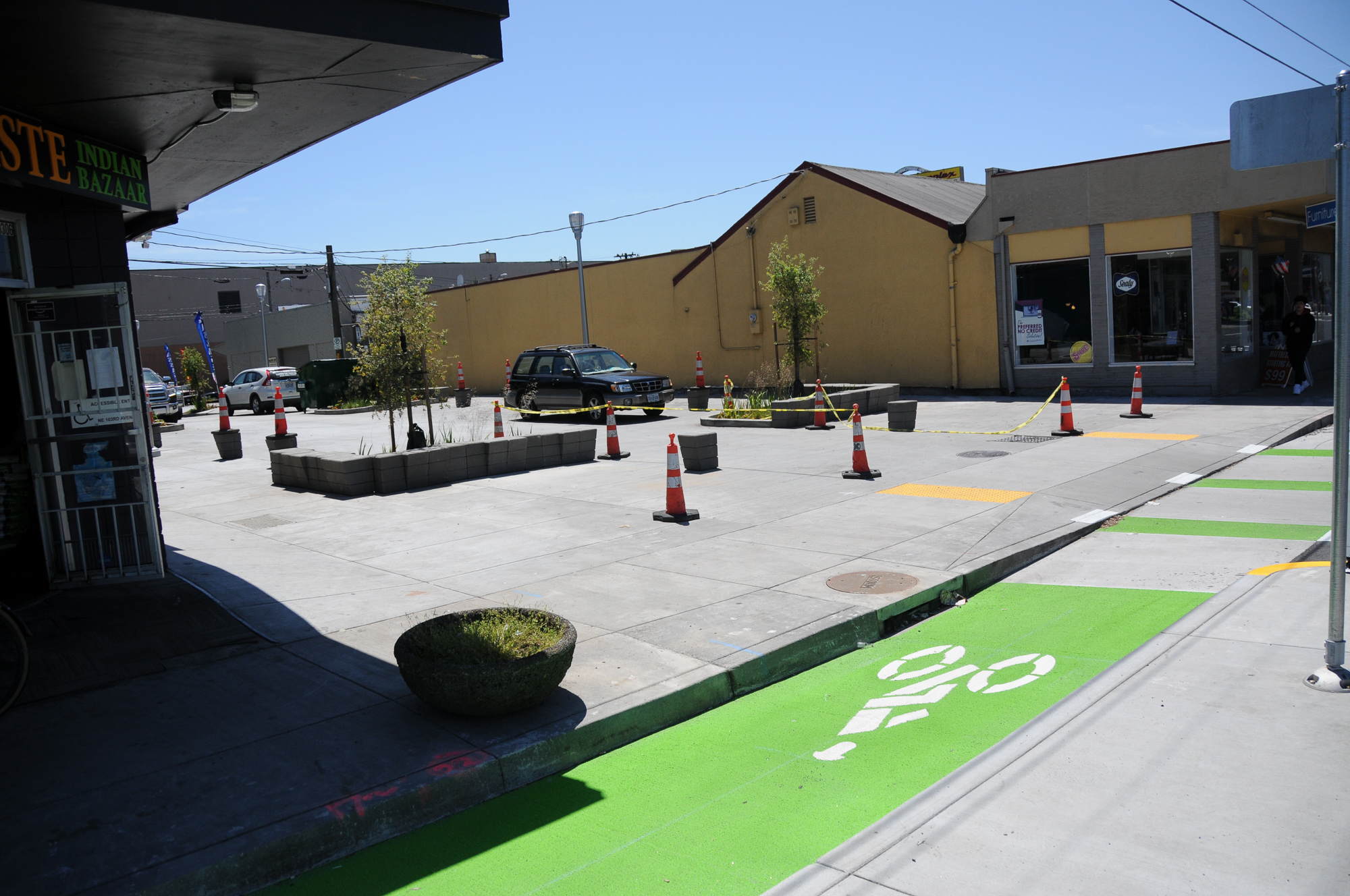
Now:
https://goo.gl/maps/kssq81uCrGWWnCkc8
A plaza for half a million!!! Metro paid developers half a million of taxes that come from mostly mid and low income taxpayers. What did these residents get for their money? Faster gentrification. Metro was run by cyclist Bob Stacey who also funded 86 million of tax money to a hotel corporation who flipped the property. ( links below ) – This is typical Portland to fund “development” when it’s really gentrification. It’s why a developer who evicted black renters on Albina sits on the city sustainability commission. Prost is a hip German restaurant on Mississippi funded by gentrification development. So many more examples of this.
https://www.wweek.com/news/2020/04/01/the-hyatt-at-the-oregon-convention-center-sold-at-a-big-profit-but-not-for-the-public/
https://www.oregonmetro.gov/news/council-unanimously-approves-hyatt-agreements-authorizes-bond-sales
Good point, Joe. Why is the people’s money being used to build twee 0.5 million dollar plazas when people are dying on our streets due to being unhoused and due to unsafe transportation infrastructure?
Probably because that wouldn’t be a legal use of the money raised by Metro’s Parks and Natural Areas levy.
Have you forgotten that we just lived through a brutal heatwave that illustrated the consequences of lack of greenspace in marginalized communities.
There are far more equitable uses of the Parks levy than building a partially-private twee plaza next to unneeded luxury housing. For example, creation of public park space that also provides amenities for our houseless neighbors (e.g. a community center model) would be a legal use of the parks levy.
No, I haven’t forgotten about the heatwave?!? You asked a question and don’t seem to like the fact that I gave you an answer.